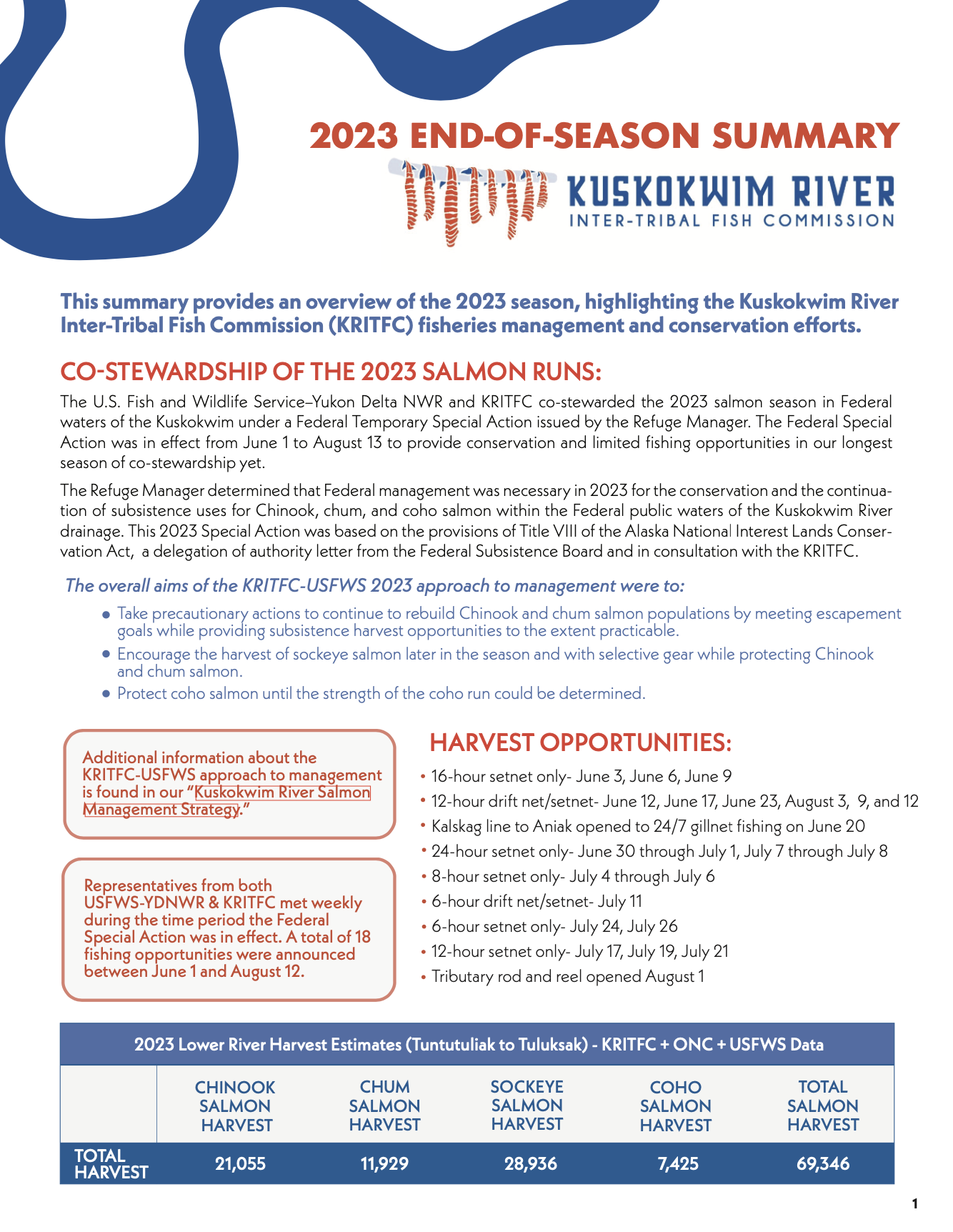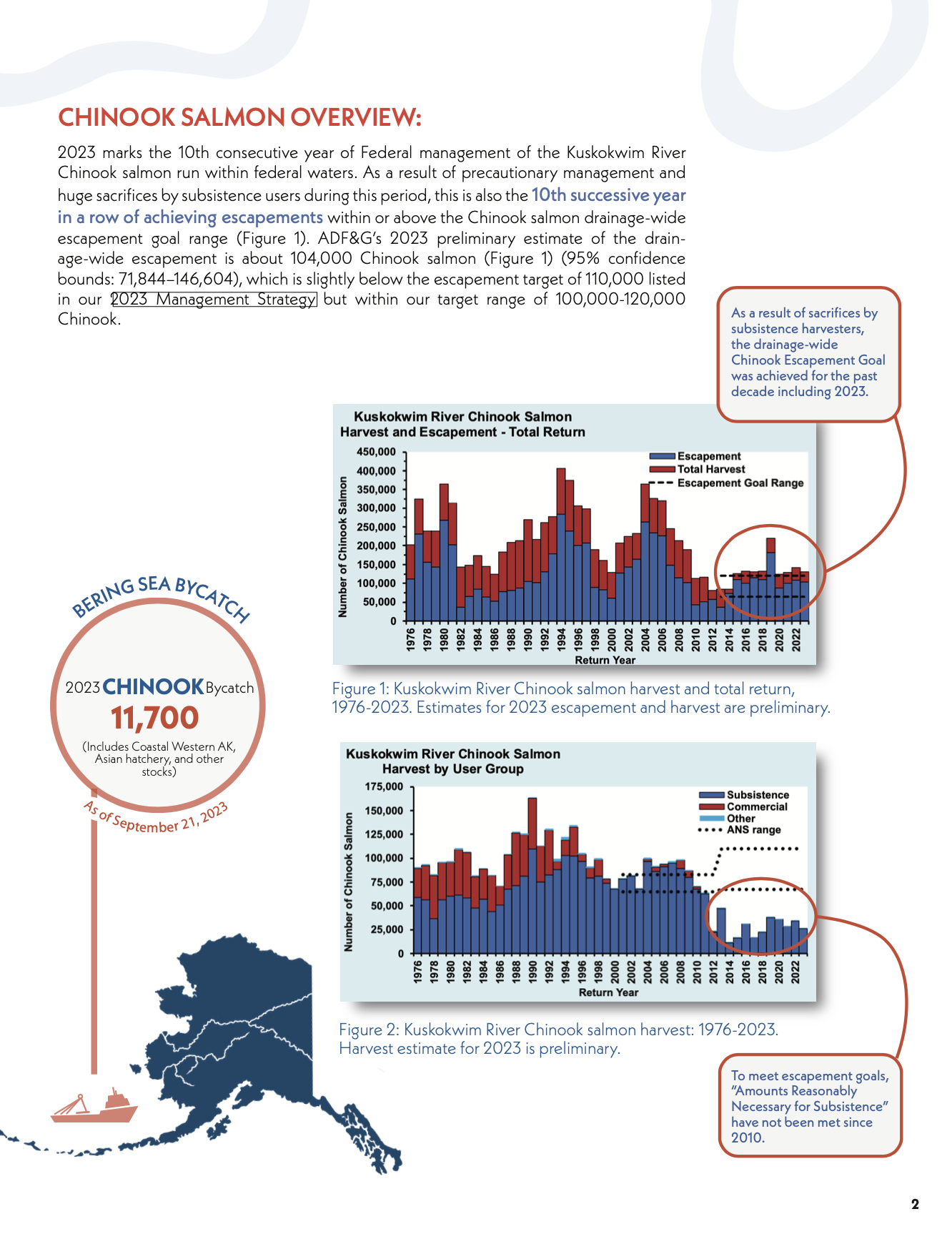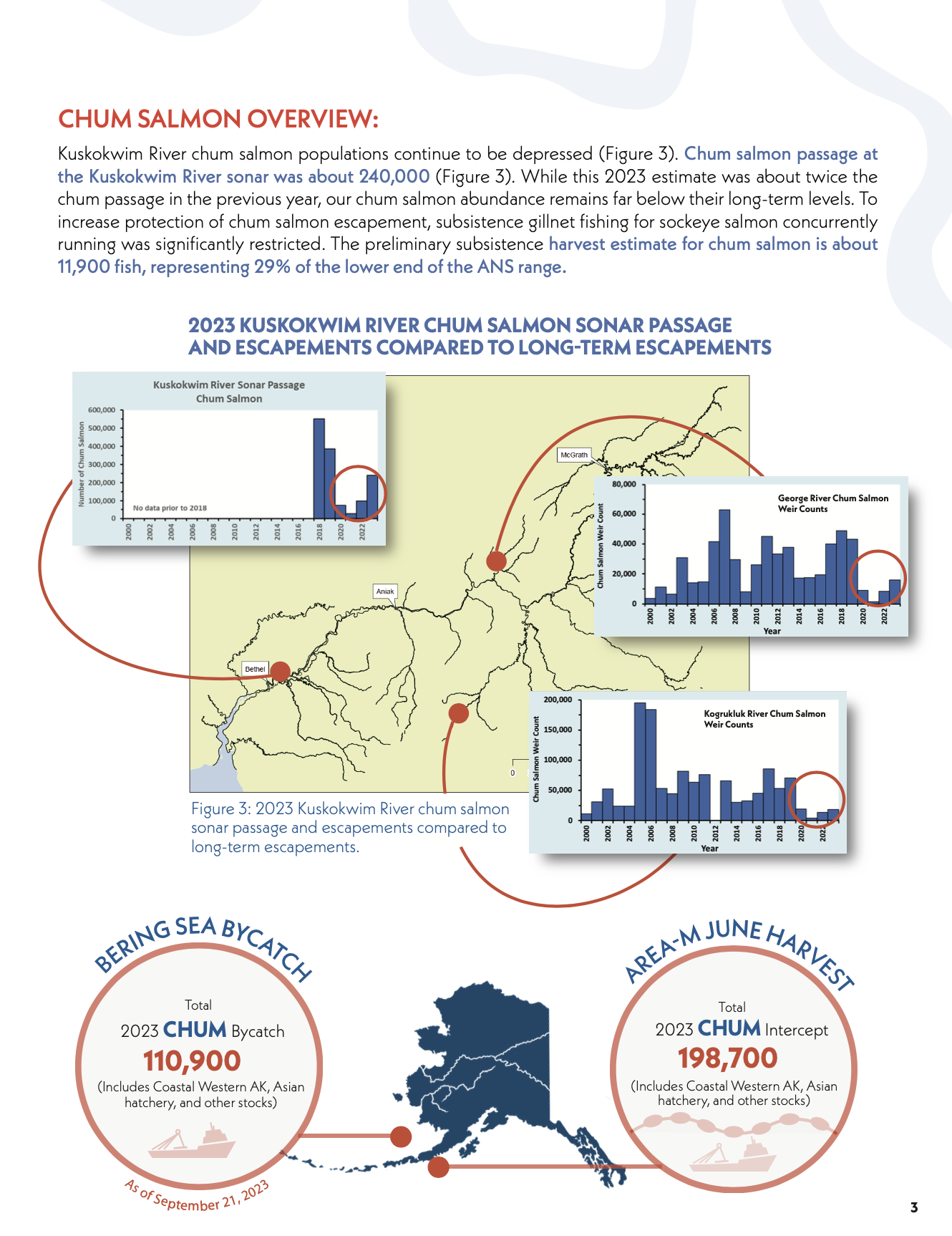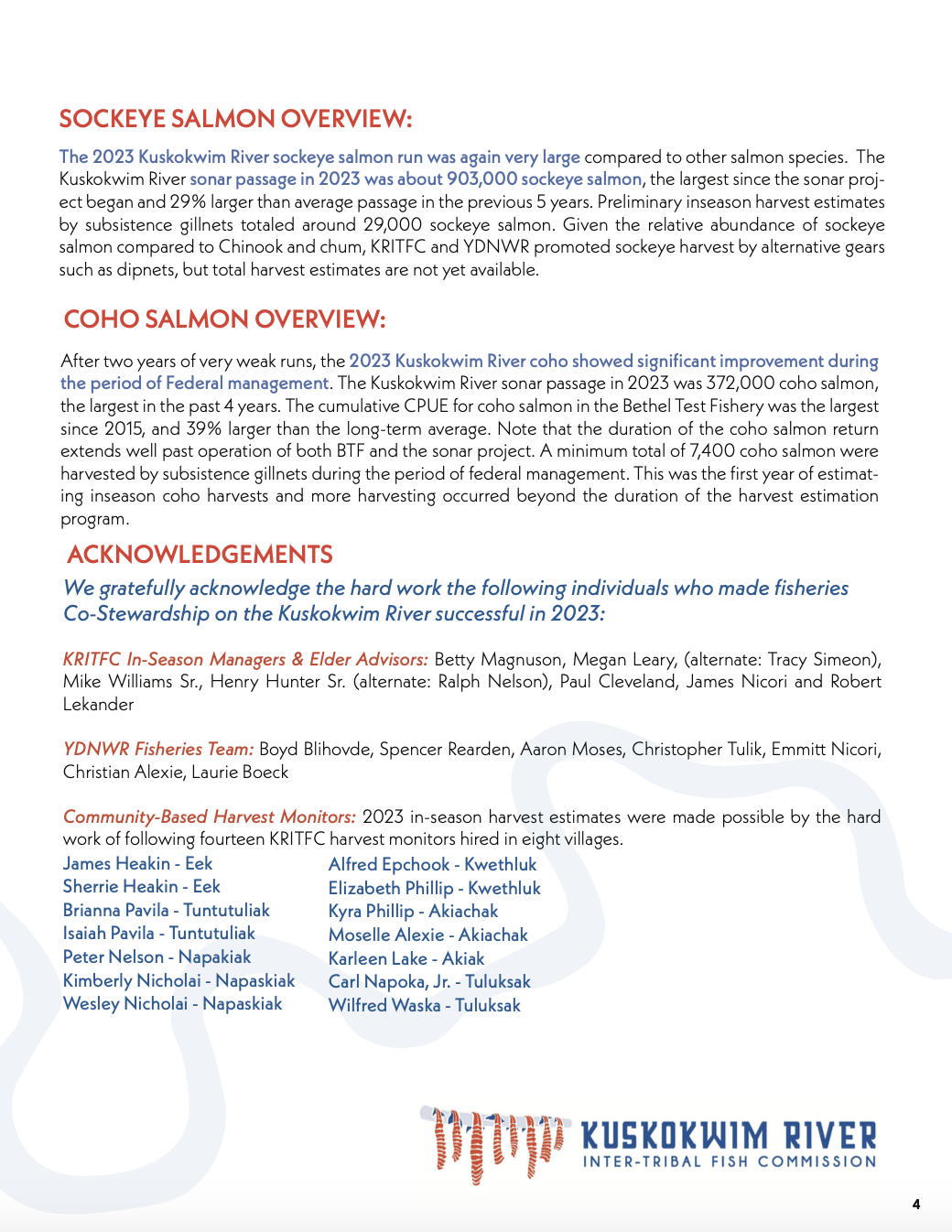2023 End-of-Season Summary
Photo by Joel Owens.
This summary provides an overview of the 2023 season, highlighting the Kuskokwim River Inter-Tribal Fish Commission (KRITFC) fisheries management and conservation efforts.
CO-STEWARDSHIP OF THE 2023 SALMON RUNS:
The U.S. Fish and Wildlife Service–Yukon Delta NWR and KRITFC co-stewarded the 2023 salmon season in Federal waters of the Kuskokwim under a Federal Temporary Special Action issued by the Refuge Manager. The Federal Special Action was in effect from June 1 to August 13 to provide conservation and limited fishing opportunities in our longest season of co-stewardship yet.
The Refuge Manager determined that Federal management was necessary in 2023 for the conservation and the continuation of subsistence uses for Chinook, chum, and coho salmon within the Federal public waters of the Kuskokwim River drainage. This 2023 Special Action was based on the provisions of Title VIII of the Alaska National Interest Lands Conservation Act, a delegation of authority letter from the Federal Subsistence Board and in consultation with the KRITFC.




The overall aims of the KRITFC-USFWS 2023 approach to management were to:
Take precautionary actions to continue to rebuild Chinook and chum salmon populations by meeting escapement goals while providing subsistence harvest opportunities to the extent practicable.
Encourage the harvest of sockeye salmon later in the season and with selective gear while protecting Chinook and chum salmon.
Protect coho salmon until the strength of the coho run could be determined.
Additional information about the KRITFC-USFWS approach to management is found in our Kuskokwim River Salmon Management Strategy.
LOWER KUSKOKWIM HARVEST OPPORTUNITIES:
Representatives from both USFWS-YDNWR & KRITFC met weekly during the time period the Federal Special Action was in effect. A total of 18 fishing opportunities were announced between June 1 and August 12:
16-hour setnet only- June 3, June 6, June 9
12-hour drift net/setnet- June 12, June 17, June 23 & August 3, 9, and 12
Kalskag line to Aniak opened to 24/7 gillnet fishing on June 20
24-hour setnet only- June 30 through July 1, July 7 through July 8
8-hour setnet only- July 4 through July 6
6-hour drift net/setnet- July 11
6-hour setnet only- July 24, July 26
12-hour setnet only- July 17, July 19, July 21
Tributary rod and reel opened August 1
CHINOOK SALMON OVERVIEW:
2023 marks the 10th consecutive year of Federal management of the Kuskokwim River Chinook salmon run within federal waters. As a result of precautionary management and huge sacrifices by subsistence users during this period, this is also the 10th successive year in a row of achieving escapements within or above the Chinook salmon drainage-wide escapement goal range. ADF&G’s 2023 preliminary estimate of the drainage-wide escapement is about 104,000 Chinook salmon (95% confidence bounds: 71,844–146,604), which is slightly below the escapement target of 110,000 listed in our 2023 Management Strategy but within our target range of 100,000-120,000 Chinook.
As of October 19, 2023, Bering Sea pollock fishery bycatch of Chinook salmon totaled 11,760 kings (includes Coastal Western Alaska, Asian hatchery, and other stocks).
CHUM SALMON OVERVIEW:
Kuskokwim River chum salmon populations continue to be depressed. Chum salmon passage at the Kuskokwim River sonar was about 240,000. While this 2023 estimate was about twice the chum passage in the previous year, our chum salmon abundance remains far below their long-term levels. To increase protection of chum salmon escapement, subsistence gillnet fishing for sockeye salmon concurrently running was significantly restricted. The preliminary subsistence harvest estimate for chum salmon is about 11,900 fish, representing 29% of the lower end of the ANS range.
As of October 19, 2023, Bering Sea pollock fishery bycatch of chum salmon totaled 112,230 chums (includes Coastal Western Alaska, Asian hatchery, and other stocks).
As of July 1, 2023, the June Area M intercept fishery chum salmon harvest totaled 198,700 chums (includes Coastal Western Alaska, Asian hatchery, and other stocks).
SOCKEYE SALMON OVERVIEW:
The 2023 Kuskokwim River sockeye salmon run was again very large compared to other salmon species. The Kuskokwim River sonar passage in 2023 was about 903,000 sockeye salmon, the largest since the sonar project began and 29% larger than average passage in the previous 5 years. Preliminary inseason harvest estimates by subsistence gillnets totaled around 29,000 sockeye salmon. Given the relative abundance of sockeye salmon compared to Chinook and chum, KRITFC and YDNWR promoted sockeye harvest by alternative gears such as dipnets, but total harvest estimates are not yet available.
COHO SALMON OVERVIEW:
After two years of very weak runs, the 2023 Kuskokwim River coho showed significant improvement during the period of Federal management. The Kuskokwim River sonar passage in 2023 was 372,000 coho salmon, the largest in the past 4 years. The cumulative CPUE for coho salmon in the Bethel Test Fishery was the largest since 2015, and 39% larger than the long-term average. Note that the duration of the coho salmon return extends well past operation of both BTF and the sonar project. A minimum total of 7,400 coho salmon were harvested by subsistence gillnets during the period of federal management. This was the first year of estimating inseason coho harvests and more harvesting occurred beyond the duration of the harvest estimation program.
ACKNOWLEDGEMENTS
We gratefully acknowledge the hard work the following individuals who made fisheries Co-Stewardship on the Kuskokwim River successful in 2023:
KRITFC In-Season Managers & Elder Advisors: Betty Magnuson, Megan Leary, (alternate: Tracy Simeon), Mike Williams Sr., Henry Hunter Sr. (alternate: Ralph Nelson), Paul Cleveland, James Nicori and Robert Lekander
YDNWR Fisheries Team: Boyd Blihovde, Spencer Rearden, Aaron Moses, Christopher Tulik, Emmitt Nicori, Christian Alexie, Laurie Boeck
Community-Based Harvest Monitors: 2023 in-season harvest estimates were made possible by the hard work of following fourteen KRITFC harvest monitors hired in eight villages: James Heakin (Eek), Sherrie Heakin (Eek), Brianna Pavila (Tuntutuliak), Isaiah Pavila (Tuntutuliak), Peter Nelson (Napakiak), Kimberly Nicholai (Napaskiak), Wesley Nicholai (Napaskiak), Alfred Epchook (Kwethluk), Elizabeth Phillip (Kwethluk), Kyra Phillip (Akiachak), Moselle Alexie (Akiachak), Karleen Lake (Akiak), Carl Napoka, Jr. (Tuluksak), Wilfred Waska (Tuluksak)


